21 Self-Determination Skills and Activities to Utilize Today
 How do we move ourselves and others to act? It all hinges on motivation.
How do we move ourselves and others to act? It all hinges on motivation.
People are often motivated to act by external influences, be they financial reward, prestige, advancement, or the opinions of others. Just as often, people are motivated from within, by their beliefs and personal values.
While extrinsic motivation is not necessarily a bad thing, it is intrinsic motivation that most effectively encourages and sustains action. We need to feel autonomous – that we are the authors and agents of our behavior – rather than feeling that external forces control our behavior.
Self-determination is primarily concerned with intrinsically driven motivation and shines a light on the interplay between the external factors and internal motives inherent in human nature.
The following article will examine the concept of self-determination, answer common questions on the subject, and take a look at some activities, assessments, and worksheets to develop and improve self-determination skills.
Before you continue, we thought you might like to download our three Goal Achievement Exercises for free. These detailed, science-based exercises will help you or your clients create actionable goals and master techniques to create lasting behavior change.
This Article Contains:
What Is Self-Determination?
Self-determination began as a political concept whereby a group of people could form their own state and choose their own government (Unrepresented Nations & Peoples Organization, 2017). After World War II, the promotion and support of self-determination became one of the primary goals of the United Nations. In psychology, self-determination refers to an individual’s ability to make choices and manage their own life.
Self-determination theory (SDT) is an approach to human motivation that emphasizes the importance of our evolved inner resources for personality development and behavioral self-regulation (Ryan, Kuhl, & Deci, 1997). Deci (1992) recognized the motivational dynamics that determine the activities an individual chooses freely and those activities they feel coerced or compelled to partake in.
Similarly, Wehmeyer (2007) defined self-determination as the primary causal agent that encourages decision making that is free from external influence. According to Field, Martin, Miller, Ward, and Wehmeyer (1998), an understanding of our strengths and limitations and a belief in ourselves as capable and competent are essential to self-determination.
When acting on the basis of these skills and attitudes, individuals have a greater ability to take control of their lives and engage in goal-directed, self-regulated, autonomous behavior.
In essence, self-determination is a combination of skills, knowledge, and beliefs that allow the individual to choose and act in accordance with those choices rather than reinforcement contingencies, drives, or other external pressures.
A Look at the Concept in Psychology
As a psychological construct, self-determination is a theory of motivation and personality that addresses issues of extrinsic and intrinsic motivation concerning universal, innate psychological needs. These needs are thought to be essential for growth and integration, constructive social development, and personal wellbeing (Ryan & Deci, 2000).
SDT postulates that humans have three innate psychological needs (Ryan & Deci, 2000):
- Competence (feeling effective)
- Autonomy (the feeling of being the origin of our behavior)
- Psychological relatedness (feeling cared for and understood by other people)
The satisfaction and fulfillment of these three needs are considered necessary and essential to vital, healthy human functioning, regardless of culture or stage of development (Silva, Marques, & Teixeira, 2014).
When these three needs are met, individuals experience more vitality, self-motivation, and wellbeing. Conversely, circumvention of these basic needs may lead to declining self-motivation and a heightened sense of ill-being (Ryan, Deci, Grolnick, & La Guardia, 2006).
Self-determination theory developed through a set of six ‘mini-theories,’ which represent a broad framework for the study of human motivation and personality:
- Cognitive evaluation theory is concerned with intrinsic motivation and how factors such as rewards, deadlines, feedback, and pressure affect feelings of autonomy and competence.
- Organismic integration theory is concerned with extrinsic motivation in its various forms and addresses the process of internalization of various extrinsic motives.
- Causality orientations theory is concerned with individual differences in tendencies to orient toward environments and regulate behavior in various ways.
- Basic psychological needs theory elaborates on the concept of the three basic psychological needs by connecting them directly with wellness.
- Goal contents theory is concerned with the distinctions between intrinsic and extrinsic goals and their impact on motivation and wellness.
- Relationships motivation theory is concerned with the development and maintenance of close personal relationships and encompasses one of the three basic psychological needs: relatedness.
Common Questions on Self-Determination
Several questions are asked regularly about self-determination, and some of the more common ones are answered below.
Why is self-determination so important?
The promotion and procurement of self-determination skills can help individuals of all ages, with or without disabilities, to assert personal control over their choices in life.
Self-determination plays a vital role in several contexts. It has been shown to increase life satisfaction in later life (Ekelund, Dahlin-Ivanoff, & Eklund, 2014), promote physical activity and weight loss (Silva et al., 2010; Teixeira, Silva, Mata, Palmeira, & Markland, 2012), moderate occupational burnout (Fernet, Guay, & Senecal, 2004), and affect motivation (Gagné & Deci, 2005).
Within an educational setting, the integration of self-determination skills such as self-regulation, decision making, and action planning has been shown to help students evaluate and set personal goals; become more autonomous, self-determined learners; and increase the sense of control over their learning (Eisenman, 2007).
When young adults develop the ability to consider and implement solutions to their problems, they become intrinsically motivated and actively engaged in the learning process (Ryan & Deci, 2000).
Wehmeyer (2005) discussed a common misconception that people with severe disabilities lack the requisite skills to exert control in their lives. While it is true that individuals with severe disabilities may be limited in the degree to which they can become more self-determined, by encouraging the expression of preferences and promoting self-advocacy, there are opportunities for them to become causal agents in their own lives.
Wehmeyer and Palmer (2003) found that students with disabilities who took part in a self-determination program were more likely to live independently and move out of the family home, hold a job, and have greater financial independence.
Is self-determined behavior always ‘successful’ behavior?
Self-determination has been linked to myriad positive outcomes, and perhaps unsurprisingly, there is a tendency to equate self-determined behavior with successful behaviors. However, even self-determined people experience failure. According to Wehmeyer (2005), the emphasis should be on the attempt to exercise control and not on the specific outcome of actions.
Self-determination should not be equated only with successful outcomes. Not every decision an individual makes turns out to be an optimal decision, nor is every goal the right goal.
What are the primary assumptions of self-determination?
According to Deci and Ryan (1985), self-determination consists of two key assumptions. The first is that the innate human need for growth drives behavior. Put simply, people are actively directed toward growth, gaining mastery over challenges, and taking on new experiences to develop a cohesive sense of self.
The second assumption focuses on the importance of autonomous motivation that has been linked to greater psychological health and more effective performance (Deci & Ryan, 2008). While individuals can be motivated by external factors such as money and acclaim, self-determination theory focuses primarily on internal sources of motivation, such as a need to gain knowledge or independence (Silva et al., 2014).
What techniques are used in self-determination interventions?
Interventions based on self-determination theory comprise many behavioral and communicative techniques that focus on the satisfaction of needs and autonomy. Reeve and Jang (2006) emphasized the importance of autonomy-based interventions within education, healthcare, parenting, and the workplace.
This focus on personal autonomy can include taking the client’s perspective, creating opportunities for client input and initiative, and providing explanatory rationales for requests made by the practitioner.
Additionally, many self-determination interventions are concerned with the support of competence and psychological relatedness needs. Many of the techniques used to support competence focus on promoting a sense of satisfaction by making progress toward self-referenced goals, attaining mastery, and developing self-determination skills (Sierens, Vansteenkiste, Goossens, Soenens, & Dochy, 2009).
Are self-determination and self-efficacy the same?
According to Sugarman and Sokol (2012), self-determination and self-efficacy are both based on the ideology that people are agents of their actions and possess complex internal structures that allow them to make choices regarding their actions. While the two theories work from a similar ideology, they also view the concept of agency from very different perspectives.
Self-efficacy reflects the capacity of individuals to take measures to achieve targeted goals (Bandura, 1997). In terms of self-efficacy, enhanced perceptions of competency lead to perceived controllability. It is an individual’s self-efficacy that drives their agency. Put simply, people act when they feel able to achieve the goals they have set.
While self-determination theory recognizes that feelings of competence are important, autonomy plays a more central role. When an individual perceives their actions as autonomous, then self-determined motivation is the main element of agency (Sweet, Fortier, Strachan, & Blanchard, 2012).
8 Self-Determination Skills to Utilize Today
While self-determination is a complex construct that includes a combination of skills and knowledge, these skills are teachable, measurable, and most effectively developed through regular practice. According to Wehmeyer, Agran, and Hughes (2000), the component skills of self-determined behavior include the following:
1. Choice-making skills
Choice making is an individual’s ability to express their preference between two or more options (Wehmeyer, 2005) and exert control over their actions and environment.
2. Decision-making skills
Similar to choice making, decision making requires effective judgments about what choices or solutions are right at any given moment. According to Wehmeyer (2007), effective decision making requires individuals to identify possible alternatives for action, the potential consequences of each action, assess the probability of each result occurring, select the best alternative, and implement the alternative decision.
3. Problem-solving skills
Problem solving requires the identification of a problem, possible solutions, and an understanding of the potential pros and cons of each solution.
4. Goal-setting and attainment skills
Goal setting and attainment skills are a critical component in the development of abilities that lead to agentic action and self-determination.
5. Self-regulation skills (including self-observation, evaluation, and reinforcement)
Self-regulation is the process by which people incorporate behavioral change into their everyday lives (Kapp, 2001). Self-regulation involves setting goals, developing a plan to achieve goals, implementing and following the action plan, evaluating the outcomes of the action plan, and adjusting accordingly. Find more self-regulation tools here.
6. Self-advocacy skills
Self-advocacy refers to an individual’s ability to express their needs and wants assertively and take action on their own behalf. More on this topic in How to Foster Self-Expression.
7. Positive self-efficacy (including an internal locus of control)
Self-efficacy with an internal locus of control encourages individuals to believe in their ability to perform and achieve goals.
8. Self-awareness skills
Self-awareness skills allow individuals to identify and understand their needs, strengths, and limitations.
7 Useful Activities and Worksheets (incl. PDF)
The following worksheets are designed to assist in the development of the component skills of self-determined behavior.
1. Self-Awareness Worksheet for Young Children
2. Self-Awareness Worksheet for Older Children
3. Self-Awareness Worksheet for Adults
4. Decision-Making Worksheet for Adults
5. Problem-Solving Worksheet for Adults
6. Emotion Regulation Worksheet
5 Assessments, Tests, and Questionnaires
Several scientific scales and assessments are available to evaluate self-determination. Below is a sampling of five of these.
1. The Basic Needs Satisfaction in General Scale (BNSG-S; Gagné, 2003)
This 21-item scale measures the three distinct needs of autonomy, competence, and relatedness with the emphasis that all three needs must be individually met for wellness. The BNSG-S was developed to assess the satisfaction of basic psychological needs in general.
Respondents are invited to indicate how true each statement is for them personally and respond on a scale from 1 (not at all true) to 7 (very true). Higher scores are indicative of a higher level of satisfaction of needs.
Basic Needs Satisfaction in General Scale
2. AIR Self-Determination Assessments
The American Institutes for Research developed the AIR Self-Determination Assessments in conjunction with Columbia University. Designed for use with adolescents, these assessments can be used to measure two broad components of self-determination:
- The knowledge, abilities, and perceptions that enable self-determination
- The opportunity to use the relevant knowledge and abilities
The AIR Self-Determination Scale produces a profile of the student’s level of self-determination, identifies areas of strength and areas needing improvement, and identifies specific educational goals.
- AIR Self-Determination Student Form
- AIR Self-Determination Parent Form
- AIR Self-Determination Educator Form
You can find guidance on how to use and interpret the results of the AIR Assessments here.
3. The ARC Self-Determination Scale (Wehmeyer & Kelchner, 1995)
The ARC Self-Determination Scale was developed to assess the self-determination strengths and weaknesses of adolescents with disabilities and to facilitate client involvement in determining goals. The assessment scores for autonomy, self-regulation, psychological empowerment, self-realization, and finally, an overall rating for self-determination.
You can find the scale, procedural guidelines, and guidance on scoring and interpretation here.
6 Books Worth Reading
The following selection of books will enhance your understanding of self-determination.
1. Intrinsic Motivation and Self-Determination in Human Behavior (Deci & Ryan, 1985)
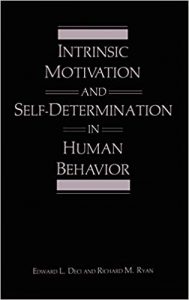 With a focus on self-determination and competence, this comprehensive publication by Deci and Ryan explores the six mini-theories in greater detail.
With a focus on self-determination and competence, this comprehensive publication by Deci and Ryan explores the six mini-theories in greater detail.
It also looks at the processes and structures related to the three innate psychological needs of autonomy, competence, and interpersonal relatedness.
Available on Amazon.
2. Self-Determination Theory in the Clinic (Sheldon, Williams, & Joiner, 2003)
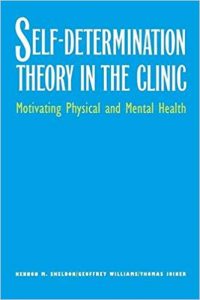 Self-Determination Theory in the Clinic provides an in-depth historical background to SDT based on three decades of empirical research.
Self-Determination Theory in the Clinic provides an in-depth historical background to SDT based on three decades of empirical research.
The authors also include numerous specific clinical and case examples to describe the theory’s application.
They show the ways it can be used to motivate patients undergoing treatment for physiological and psychological issues such as diabetes management, smoking cessation, post-traumatic stress, obsessive-compulsive disorder, and depression.
Available on Amazon.
3. Self-Determination Theory: Basic Psychological Needs in Motivation, Development, and Wellness (Ryan & Deci, 2018)
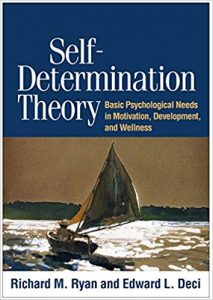 Ryan and Deci examine the philosophical and historical considerations related to intrinsic motivation and self-determination in addition to the six mini-theories on which the framework of SDT was built.
Ryan and Deci examine the philosophical and historical considerations related to intrinsic motivation and self-determination in addition to the six mini-theories on which the framework of SDT was built.
Additionally, the authors discuss the application of self-determination theory in multiple domains, including healthcare, education, sports, virtual environments, and organizations.
Available on Amazon.
4. Self-Determination Theory (SDT): Perspective, Applications, and Impact (Wade, 2017)
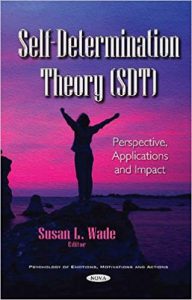 This book provides a comprehensive rundown of research in the study of SDT, including perspectives on gender differences in pro-environmental behaviors and professional athletes from an SDT perspective.
This book provides a comprehensive rundown of research in the study of SDT, including perspectives on gender differences in pro-environmental behaviors and professional athletes from an SDT perspective.
Wade discusses the motivational typology in self-determination theory and explores the egoistic side of public service motivation.
Available on Amazon.
5. The Handbook of Self-Determination Research (Deci & Ryan, 2004)
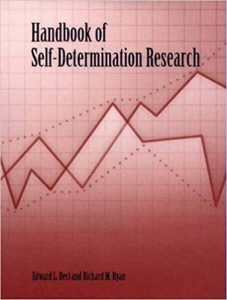 The Handbook of Self-Determination Research summarizes over 20 years of self-determination research findings from social, personality, clinical, developmental, and applied psychologists.
The Handbook of Self-Determination Research summarizes over 20 years of self-determination research findings from social, personality, clinical, developmental, and applied psychologists.
With an emphasis on the importance of self-determination for understanding basic motivational processes and solving pressing real-world problems, this handbook provides a detailed overview of self-determination theory and explores the current state of self-determination research in relation to other areas of inquiry such as coping, self-esteem, and interest.
Available on Amazon.
6. The Oxford Handbook of Work Motivation, Engagement, and Self-Determination Theory (Gagné, 2014)
 The Oxford Handbook of Work Motivation, Engagement, and Self-Determination Theory brings together self-determination theory experts and organizational psychology experts to discuss a wide range of topics.
The Oxford Handbook of Work Motivation, Engagement, and Self-Determination Theory brings together self-determination theory experts and organizational psychology experts to discuss a wide range of topics.
The book provides suggestions for practitioners on how to adjust their programs and practices using self-determination theory principles.
Topics in the handbook include self-determination research and practice, the application of self-determination theory to the field of organizational psychology, suggestions for future research in organizational psychology, and a range of topics related to motivation in the workplace.
The book is available here.
If you like book lists, be sure to read this entry on self-esteem books.
A Take-Home Message
We need to feel autonomous and that we are the authors and agents of our own behavior rather than believe that external forces control our behavior.
Being self-determined and having the autonomy to make choices that shape your future is essential. It means knowing what you want, making choices that are right for you in the moment, and actively making things happen in your own life. When we pursue activities and behaviors that are intrinsically motivated and aligned with our personal goals, we feel happier, more in control, and capable.
I hope you have enjoyed this piece on self-determination. What are your thoughts on the subject? Let us know in the comments.
We hope you enjoyed reading this article. Don’t forget to download our three Goal Achievement Exercises for free.
- Bandura, A. (1997). Self-efficacy: The exercise of control. W. H. Freeman.
- Deci, E. L., & Ryan, R. M. (1985). Intrinsic motivation and self-determination in human behavior. Plenum.
- Deci, E. L. (1992). The relation of interest to the motivation of behavior: A self-determination theory perspective. In K. A. Renninger, S. Hidi, & A. Krapp (Eds.), The role of interest in learning and development (pp. 43–70). Lawrence Erlbaum Associates.
- Deci, E. L. & Ryan, R. M. (2004). The handbook of self-determination research. University Rochester Press.
- Deci, E. L., & Ryan, R. M. (2008). Facilitating optimal motivation and psychological well-being across life’s domains. Canadian Psychology, 49, 14–23.
- Eisenman, L. Y. (2007). Self-determination interventions: Building a foundation for school completion. Remedial and Special Education, 28, 2–8.
- Ekelund, C., Dahlin-Ivanoff, S., & Eklund, K. (2014). Self-determination and older people – A concept analysis. Scandinavian Journal of Occupational Therapy, 21(2), 116–124.
- Fernet, C., Guay, F., & Senecal, C. (2004). Adjusting to job demands: The role of work self-determination and job control in predicting burnout. Journal of Vocational Behavior, 65, 39–56.
- Field, S. S., Martin, J. E., Miller, R. J., Ward, M., & Wehmeyer, M. L. (1998). Self-determination for persons with disabilities: A position statement of the Division on Career Development and Transition. Career Development for Exceptional Individuals, 21, 113–128.
- Gagné, M. (2003). The role of autonomy support and autonomy orientation in prosocial behavior engagement. Motivation and Emotion, 27, 199–223.
- Gagné, M. (2014). The Oxford handbook of work motivation, engagement, and self-determination theory. Oxford University Press.
- Gagné, M., & Deci, E. L. (2005). Self-determination theory and work motivation. Journal of Organizational Behavior, 26(4), 331–362.
- Kapp, C. B. (2001). Self-regulation in childhood. In N. J. Smelser & P. B. Baltes, International encyclopedia of social and behavioral sciences (pp. 13862–13866). Elsevier.
- Reeve, J., & Jang, H. (2006). What teachers say and do to support students’ autonomy during a learning activity. Journal of Educational Psychology, 98, 209–218.
- Ryan, R. M., Kuhl, J., & Deci, E. L. (1997). Nature and autonomy: Organizational view of social and neurobiological aspects of self-regulation in behavior and development. Development and Psychopathology, 9, 701–728.
- Ryan, R. M., & Deci, E. L. (2000). Self-determination theory and the facilitation of intrinsic motivation, social development, and well-being. American psychologist, 55, 68.
- Ryan, R. M. & Deci, E. L. (2018). Self-determination theory: Basic psychological needs in motivation, development, and wellness. Guilford Press.
- Ryan, R. M., Deci, E. L., Grolnick, W. S., & La Guardia, J. G. (2006). The significance of autonomy and autonomy support in psychological development and psychopathology. In D. Cicchetti & D. J. Cohen (Eds.), Developmental psychopathology: Theory and method (2nd ed.) (pp. 795–849). John Wiley & Sons.
- Sheldon, K. M., Williams, G., & Joiner, T. (2003). Self-determination theory in the clinic: Motivating physical and mental health. Yale University Press.
- Sierens, E., Vansteenkiste, M., Goossens, L., Soenens, B., & Dochy, F. (2009). The synergistic relationship of perceived autonomy support and structure in the prediction of self-regulated learning. British Journal of Educational Psychology, 79(1), 57–68.
- Silva, M. N., Marques, M. M., & Teixeira, P. J. (2014). Testing theory in practice: The example of self-determination theory-based interventions. European Health Psychologist, 16(5), 171–180.
- Silva, M. N., Vieira, P. N., Coutinho, S. R., Minderico, C. S., Matos, M. G., Sardinha, L. B., & Teixeira, P. J. (2010). Using self-determination theory to promote physical activity and weight control: a randomized controlled trial in women. Journal of Behavior & Medicine, 33, 110–122.
- Sugarman, J., & Sokol, B. (2012). Human agency and development: An introduction and theoretical sketch. New Ideas in Psychology, 30, 1–14.
- Sweet, S. N., Fortier, M. S., Strachan, S. M., & Blanchard, C. M. (2012). Testing and integrating self-determination theory and self-efficacy theory in a physical activity context. Canadian Psychology, 53, 319–327.
- Teixeira, P. J., Silva, M. N., Mata, J., Palmeira, A. L., & Markland, D. (2012). Motivation, self-determination, and long-term weight control. The International Journal of Behavioral Nutrition and Physical Activity, 9, 22.
- Unrepresented Nations & Peoples Organization. (2017, September 21). Self-determination. Retrieved August 20, 2021, from https://unpo.org/article/4957
- Wade, S. L. (2017). Self-determination theory (SDT): Perspective, applications, and impact. Nova.
- Wehmeyer, M. L. (2005). Self-determination and individuals with severe disabilities: Re-examining meanings and misinterpretations. Research and Practice for Persons with Severe Disabilities, 30, 113–120.
- Wehmeyer, M. L. (2007). Promoting self-determination in students with developmental disabilities. Guildford Press.
- Wehmeyer, M. L., & Kelchner, K. (1995). The ARC’s Self-Determination Scale. The ARC of the United States.
- Wehmeyer, M. L., Agran, M., & Hughes, C. (2000). A national survey of teachers’ promotion of self-determination and student-directed learning. Journal of Special Education, 34, 58–68.
- Wehmeyer, M. L. & Palmer, S. B. (2003). Adult outcomes for students with cognitive disabilities three years after high school: The impact of self-determination. Education and Training in Developmental Disabilities, 38, 131–144.
Let us know your thoughts
Read other articles by their category
- Body & Brain (49)
- Coaching & Application (57)
- Compassion (26)
- Counseling (51)
- Emotional Intelligence (24)
- Gratitude (18)
- Grief & Bereavement (21)
- Happiness & SWB (40)
- Meaning & Values (26)
- Meditation (20)
- Mindfulness (45)
- Motivation & Goals (45)
- Optimism & Mindset (34)
- Positive CBT (28)
- Positive Communication (20)
- Positive Education (47)
- Positive Emotions (32)
- Positive Leadership (18)
- Positive Parenting (4)
- Positive Psychology (33)
- Positive Workplace (37)
- Productivity (16)
- Relationships (46)
- Resilience & Coping (36)
- Self Awareness (21)
- Self Esteem (38)
- Strengths & Virtues (32)
- Stress & Burnout Prevention (34)
- Theory & Books (46)
- Therapy Exercises (37)
- Types of Therapy (64)





What our readers think
Dear Ms Houston ,
I came across your article and it has been very helpful. I am currently a doctoral student in the writing stage of my dissertation which focuses on self determination strategies for African American middle school males. Could you share your reference list?
Hi Crystalyn,
Glad you found the post useful! If you scroll to the very end of the article, you will find a button that you can click to reveal the reference list.
Hope this helps!
– Nicole | Community Manager
Ms. Houston
Your Article was very useful for my Technical Writing and Communication class. It had very essential information that I will be incorporating into the curriculum
Thank you,
Flo | Adjunct Professor
Dear Miss Houston:
I am faculty of the Philippine Normal University. I am currently preparing a toolkit for a few students (some 20 of them) who may have difficulty accessing internet resources due to technological limitations. My university has decided to have our resources printed out for distribution to the marginalized pre-service teachers. We are giving out the toolkits for free.
As I develop my course toolkit, I came across this site and your material on Self-Determination. I think it offers valuable inputs that would be very helpful to my students as they study our course independently.
In this regard, I wish to seek your permission to copy and paste some parts of your material on the toolkit. I assure you that everything from your material will be attributed to your name. We can expect that my students would refer to it along with some more related materials.
I have placed it tentatively on my toolkit. I shall finalize when I receive your decision.
Thank you so much!
Ruth
Hi Ruth,
We’re glad you’ve enjoyed our resources. You are welcome to include any of the free resources/exercises we provide here in your toolkit, but please use them as presented for download (i.e., retaining the PositivePsychology.com branding) rather than copying them with different branding.
Thank you 🙂
– Nicole | Community Manager